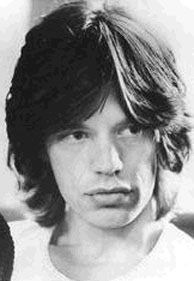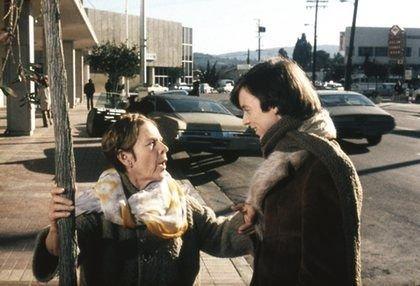Coincidentally, my friend Cynthia invited me today to see the Scorsese concert film Shine a Light. I say coincidentally because only yesterday I spoke of Placido Domingo – a man aged 67 in a performance that essentially conveys a romantic vision of a god. And only three days ago I talked about friendships between people of different ages, which prompted (to my great surprise) many comments touching on May/December sexual relationships – which I had not been thinking about.
Troy’s comments in particular seemed to wrestle with that question from both directions. On the one hand Harold and Maude is an ideal of the much older woman (played by Ruth Gordon) using a sexual connection to lead the young man (played by Bud Cort) away from his obsession with death. On the other hand, Troy also pointed out those unsettling relationships in which a man of seventy and a much younger woman have what appears (at least from the outside) to be a purely transactional relationship: He gives her luxury and she gives him the illusion of continuing life and vitality.
I say that this is all coincidental because Shine a Light takes a particular premise of The First Emperor much further. In Tan Dun’s opera we believe Placido Domingo’s Emperor to be a compelling and vital figure, but essentially a father figure – not a lover. That awesome voice is used to illuminate the soul of an attractive man, but decidedly an older man, concerned mainly with consolidating his legacy and power.
But in Shine a Light we are shown a different god. Where Placido Domingo was Zeus, Mick Jagger is Eros, god of love, lust and sexual potency. As Jagger is approaching 65, almost contemporary with Domingo, his figure of Eros becomes more interesting. When he was a beautiful young man in his twenties, it was an obvious choice. Everything about him exuded young sexual potency – from the come-hither eyes to the almost obscenely full lips, he was the ultimate sexualized boy-man, Peter Pan on testosterone, inviting young women out to play:

But now of course he looks completely different. His face is proudly craggy, an old man’s face. If anything he looks even more aged than his years. But the body is still that of a slender teenage boy, the eyes still flash with sexual mischief, and the energy is infinite. Cynthia and I compared notes after the film, and we realized that we had both been thinking the same thing: That when he was on stage singing and dancing, he was incredibly beautiful.

It’s not how he looks, it’s how he moves, the spirit that inhabits his body while he is up thre on the stage, as though one is seeing a Faun, a creature of pure pleasure and sexual delight. The concert was filmed at the Beacon Theatre in New York, and the filmmakers made sure that the front row of standing and swaying fans consisted mainly of beautiful young women, who all looked to be about eighteen.
I was particularly intrigued by the power dynamic between Jagger and these young women. He barely notices them – he is, after all, Eros and Dionysus all rolled into one, and they are mere mortals – whereas they can’t take their eyes off him. They seem completely mesmerized. When he sings Some Girls they are all transported. I know this is all conjecture, but at this point in the concert I got the sense that these fans were thinking: “This, right here and now, is what I wish sex with my boy friend was like.”
One concluseion to reach is that “age” is a red herring in trying to get a handle on human relationships – it is used as a signifier to stand in for other things, and the fit is not very good. The real tension – as I obliquely alluded to in a post several weeks ago – is between Eros and Thanatos. These represent, as Freud described it, the struggle within every individual between the will to life and the will to death – the constant battle between the joy of being and the pull toward annihilation.
Troy’s two examples: Ruth Gordon’s Maude and the old man “buying” the young wife, are actually on opposite ends of this scale. Maude is the Eros that rescues Harold from Thanatos. Her own real battles with death, including her obliquely referenced time in a WWII Concentration Camp, have pushed her to develop skills for embracing life, to the point where she is a healer – eventually this eighty year old woman takes the teenage boy to bed, and the film makes it clear that her influence has saved him from a life of morbid denial of joy.

In contrast, the archetypical image of the old man “buying” the young woman as a wife or companion is quite the opposite. In terms of life (as opposed to mere material wealth, which does not confer life) such a man is Thanatos – taking, not giving. He is in fact a vampire of Eros, drawing on his young wife’s vitality, since he has none of his own.
Jagger is very much in the former camp. Like all humans who become figures of Eros, he is erotically self-sufficient. He does not need the Other to provide his sexual empowerment and fulfilment – he embodies fulfillment. I think that the peculiar and enduring power of the holy trinity of American pop idols – Elvis, Marilyn and James Dean – is precisely that they are all erotically self-sufficient. People are drawn to the illusion of infinite Eros that they represent.
This image is precisely what Jagger is creating onstage, and the young women in the audience know this. I don’t think it is relevant whether any of those fans would actually sleep with him (they might or might not – I wouldn’t know), because that is not the transaction going on here. What they are drawing from him is the power of the fantasy that he creates of infinite sexual enjoyment. Because he gives, rather than takes, they see him as Eros, not Thanatos, even though he looks old enough to be their grandfather.
I think it is important, when we look at the dynamic between people, to account for factors on the Eros/Thanatos dialectic that transcend such relatively shallow categories as age, ethnicity or gender. For example, Oona O’Neil fell madly in love with Charlie Chaplin (they remained happily married for thirty four years) even though he was thirty nine years older than she was, and I strongly suspect she saw him as a figure of Eros. The bottom line is that we are drawn to those from whom we draw life.

Oona and Charlie Chaplin
We cannot change when we were born, or where we come from, or many other things about ourselves. But we can – any of us – choose to emulate Maude, to find ways of embracing Eros rather than Thanatos, and to continue at any age to reach out toward life with joy and a sense of fun. Sounds like a plan to me.
Another point in this complex discussion, is curiosity or obsession with someone that is in an entirely different time/place in life. Either in a place in the future that one nostalgically misses, or, in a place in the future that one is drawn to.
Here are two examples.
On one side, there is Humbert’s nympholepsy that leads to his obsession with Lolita. One could argue that he’s simply projecting Annabel onto Lolita, and, of course, that he’s an obsessed pedophile. What is Nabokov saying in regards to human relationships that span generations here? Is this a true relationship, or simply a longing for something long lost?
Then, on the complete opposite side, is Mena Suvari’s obsession with her girlfriend’s father in American Beauty. It starts when she is flattered that he notices her, and she craves attention. But then the flattery morphs. She becomes intrigued with the idea of being attractive to an older, more experienced man. She craves the attention, but, is also drawn to the idea of being with an adult. Her obsession leads to her taunting him. Eventually, he gains self esteem by taking control of his life and making changes in his life, that was up to this point, more or less a failure. At the moment of truth they both realize that the fantasy was just that, a fantasy. The reality wasn’t what either of them wanted. Here, Kevin Spacy had an Humbertian, pedophilic obsession with Miss Suvari, during a life changing realization that his life was in a rut. So, was his obsession with this young girl a cause or effect of his personal realizations? In any case, it was clear that this was simply an obsessive relationship from both ends.
In any case, these are two transgenerational relationships that demonstrated a curiousity, or longing for something that was either not yet achieved, or, long lost. In the end, none of these were viable, healthy, or normal relationships.
This fascinating discussion leads me to the character of Eros. Yes, he was the God of love, but he did not want his wife Psyche to know who he really was. Egged on by her jealous sisters, Psyche (the most beautiful human woman in the world) turned on the light one night and noticed that the man she was married to was a God (Of love no doubt). When he awoke, feeling that his wife betrayed him, he flew away, leaving Psyche to fend for herself by contacting his mother Aphrodite (who incidently, hated Psyche from the start of the story). Psyche had to go to the underworld to regain her husband’s trust and eventually, they both forgave each other. Let’s not forget that gods and goddesses are certainly not perfect creatures the same way humans are not perfect. They may have magical abilities, like Mick Jagger’s talent and performative sexuality, but I think he at this stage in his life gives creative inspiration to the girls in the front row, the way Tina Turner gives inspiration at 68 years old or Madonna at 50. These icons make getting older look cool, not cold and lonely.
Regarding Harold and Maude: I don’t know if I would have called her Harold’s healer as much as I would have called her the Grinning Reaper or Harold’s Death Wish personified. She’s as fascinated with death as Harold is, only Harold plays tricks with Death. He does not follow through with it ever…It is only to get a rise out of his parents, who want to marry him off to women he has no connection with (Which is death in and of itself). When he meets Maude, she’s having fun at the funeral, sitting on a tree I think, like the Cheshire Cat. She steals cars, drives crazily, lives in a broken down old bus, has been in concentration camp (although she never discusses it) and sings that great Cat Stevens song that goes something like
“If you want to be me, be me
And if you want to be you, be you
There’s hella of alot of things to know
you know that there are….”
The two of them can be amongst total destruction, hard social conventions and puritanical conformity, and yet they find love, peace and joy with each other. When Maude finally begins to kill herself by swallowing a bunch of pills on her birthday, it is Harold who tries to save her from it. Maude’s death by suicide teaches Harold how precious his life is, in spite of its horrors. He cannot save her as much as he needs to save himself, which you know at the end of the movie he does by not going off the cliff. He takes out his ukalalee and starts playing the song again. Facing Death (personified by Ruth Gordon) makes him live fully.
There’s another great movie that I want to mention that has an analogous feel to this discussion, but nevertheless, it’s worth mentioning.
Portrait of Jennie with Jennifer Jones and I think it’s either Glenn Ford or joseph Cotton (I’m not sure now), but it’s about a struggling artist who meets a young girl in Central Park. Every time he sees her, she grows older by dog years. She keeps saying to him, “Please wait for me until I grow up to be with you.” Or something like that. What’s beautiful about this drenchingly romantic fantasy story is that their love for each other never changes no matter how old or how young she is. She is his muse to create art and grow as an artist, he is the safe, loving, creative inspiration for her to grow to who she wanted to be. So yes, I’m in agreement with the fact that if two consenting ADULTS choose to be together (not a sixteen year old like Mena in American Beauty) what is wrong with that? Love is love and it comes in all shapes, sizes, colors and ages and it is not obsessive or possessive at all or least it shouldn’t be.
Randy Pausch, who just gave a commencement speech at Carnegie Mellon the other day said something like, ” I did not get married until I was 39 because I had finally found someone I wanted to love and give to more than myself. He then went over, kissed his wife, picked her up and carried her off like the happy romantic…That beautiful gesture was so inspiring to me. Here’s a man, who is facing death and living his life fully and happily. That moment was as inspirationally sexy as watching Mick Jagger perform.